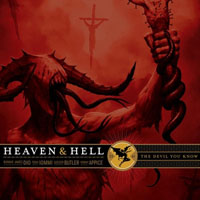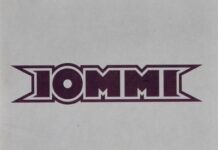Reunion albums are not typically built for endurance. They can summon fond memories, hint at the greatness that was, but rarely do they live up to the lofty expectations. That’s why a lot of bands who reunite stick to the road and avoid the recording studio like groupies with paternity suits. They know what the masses want to hear, and it isn’t usually something new and different. It can be said that reunited bands that dare to make new records stand to tarnish their legacy, but a small cadre of diehards won’t have it any other way. They want the hits and they want new music too. And if it sucks, so be it — at least, they gave it a try. Which brings us to Heaven & Hell’s The Devil You Know.
Here’s a reunion album with a lopsided back story. Singer Ronnie James Dio, guitarist Tony Iommi and bassist Geezer Butler first recorded under the Black Sabbath moniker back in 1980. Along with drummer Bill Ward, they made a fabulous album called Heaven & Hell, and dispelled any doubts of Sabbath going forward without Ozzy Osbourne. At least, for the short-term. Mob Rules, the follow-up, had its moments, but wasn’t quite as strong. A live album sent Dio packing for a solo career, Osbourne became a household name and Sabbath floundered with a roster of recruits under Iommi’s spotty leadership for a number of years.
Reunions in the 90s and 00s brought both Osbourne and Dio back to the Sabbath fold, which presented a prosperous wrinkle to the situation. In 2007, the stipulation that the Black Sabbath name remain with the original members was put into place to clearly confirm the existence of two different bands. In return, the Dio model took the name of their 1980 debut, which means The Devil You Know is technically the debut studio album from Heaven & Hell, the band.
Now that we have all that all cleared up, we can move on to the actual record itself. To begin, this one cannot be judged on the merit of your typical debut album. The guitar and bass work have that Sabbath ring, and Dio brings his voice and words to the mix. The Devil You Know could be held up to the standard set by Heaven & Hell, the album. But that’s where, like Mob Rules and 1992’s Dehumanizer, it doesn’t have a fighting chance.
On the first pass, you won’t hear anything here that grabs your balls with the guttural clutch of “Neon Knights.” The first two, “Atom And Evil” and “Fear,” fire up the furnace, plodding along without much snap, crackle or punch. It isn’t until “Bible Black” that the band harnesses a firm foundation and gets down to serious crunching. Even so, it’s an initial indication of an heir apparent lick from Iommi’s arsenal of riffs, and half-hearted at best.
Dio’s ephemeral lyrics, as usual, dabble in despair and darkness, suitably aligned with the rumble of Iommi, Butler and drummer Vinny Appice (upbeat love songs have no place here). “Double The Pain” ups the stakes and delivers one of the record’s more memorable choruses and chord progressions. “Rock And Roll Angel,” brought to life by a piercing, stinging lead from Iommi, basks in shades of light and heavy, giving rise to the rigid potential of this fine group of musicians. “The Turn Of The Screw,” “Eating The Cannibals” and “Neverwhere” are headbanger fests that pile drive the muscle without furthering an agenda into unfamiliar territory. Then, at one point, the record trips and falls into “Follow The Tears,” catapulted by a jagged, growling sustain that assures Iommi’s preeminence as the one and only king of heavy metal guitar.
Collectively, the songs on The Devil You Know could easily get lost in the discographical shuffle of each player’s CV. Iommi and Butler are the meat and potatoes of “Paranoid” and “Iron Man.” Dio has his own band to fall back on. Was the Heaven & Hell merger done out of necessity, boredom or pleasure? This album opens the door to all sorts of possibilities. But consider if you will: An outside producer, a little less mud in the mix, tighter arrangements and an array of molten lava classic riffs could lay the groundwork for Heaven & Hell’s own legacy — far and away from the shadow of Black Sabbath.
~ Shawn Perry




















